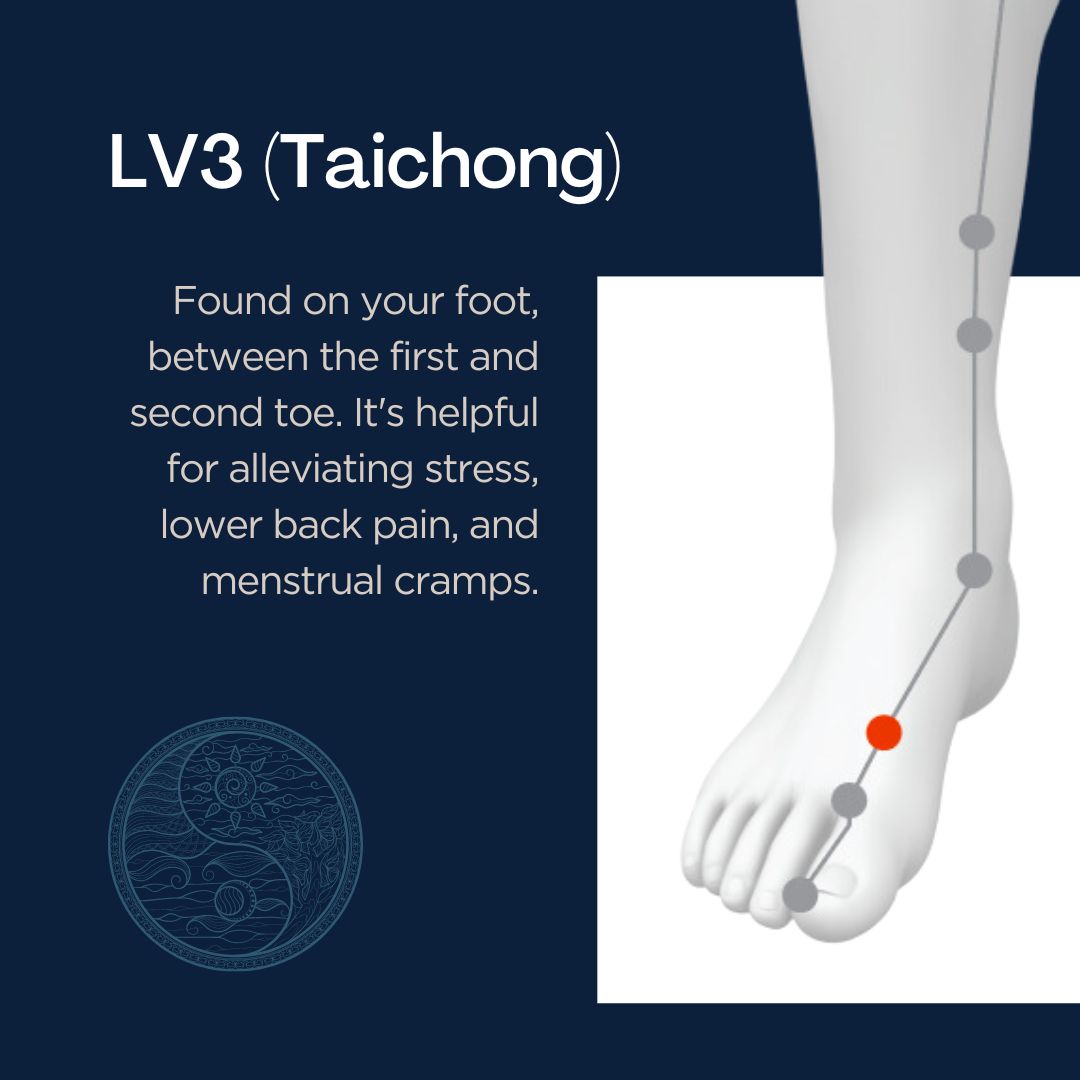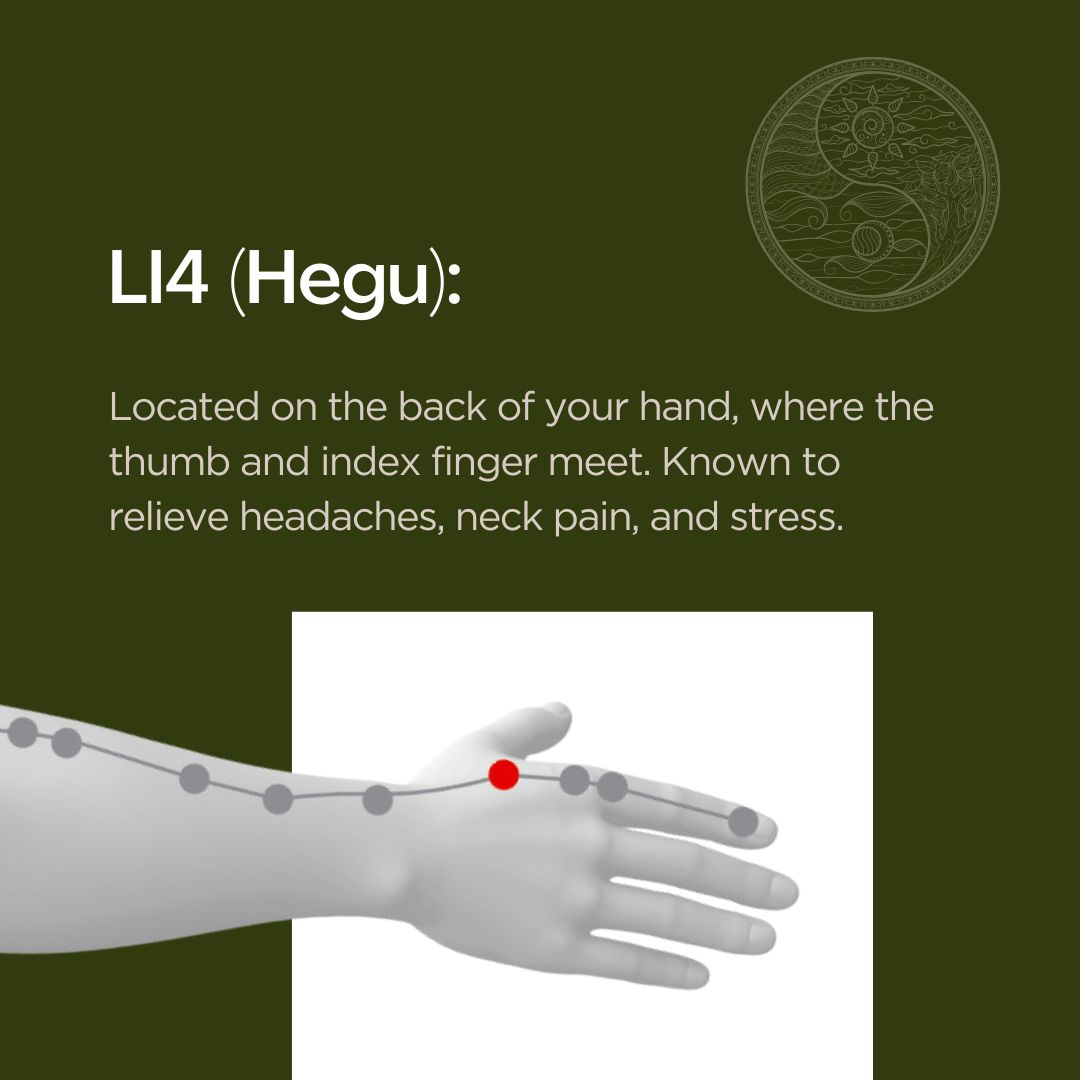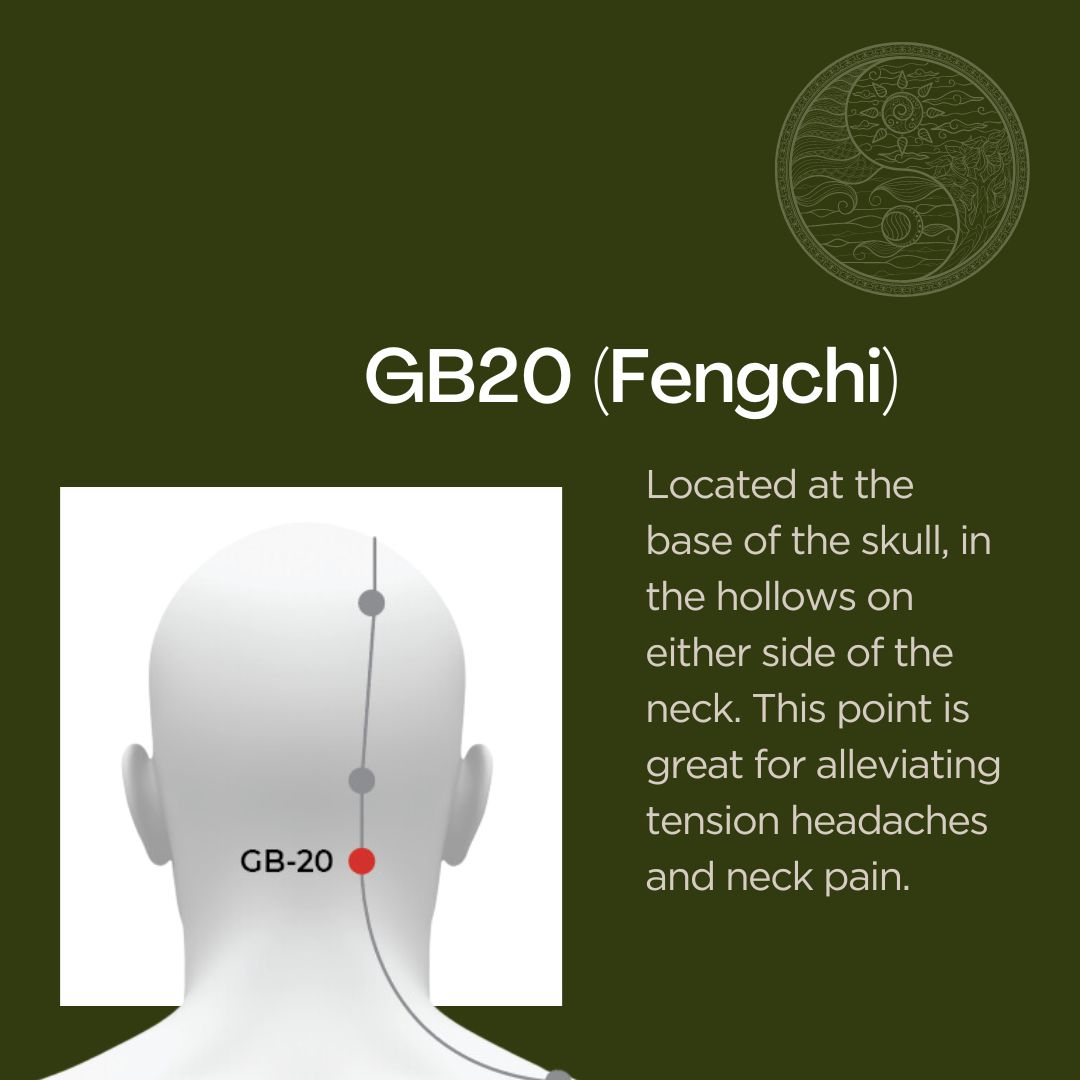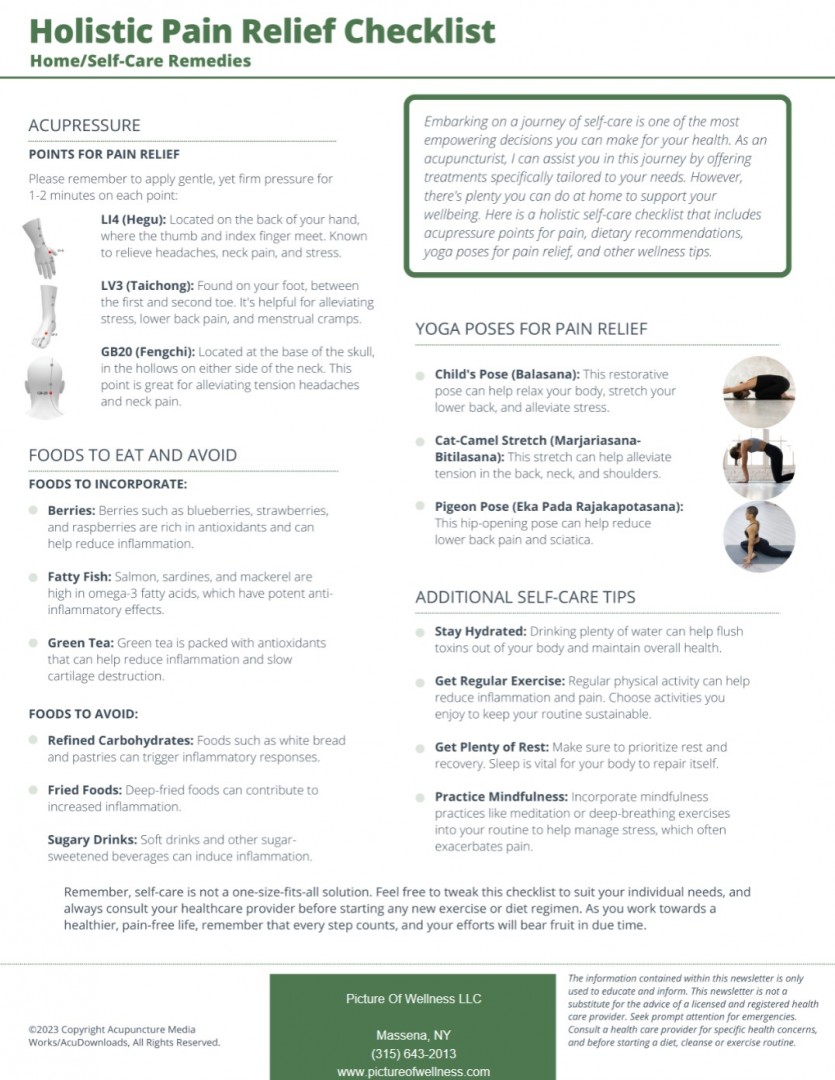November 25, 2024  Have you ever wondered how acupuncture might help with the discomfort or pain you’ve been experiencing?
Have you ever wondered how acupuncture might help with the discomfort or pain you’ve been experiencing?
Acupuncture works by tapping into the body's natural energy channels, or meridians. When there's pain, it often suggests there's an imbalance in these channels. With each session, we aim to restore this balance, promoting natural healing. It's quite fascinating how our bodies can heal themselves when given the right support.
You know how sometimes a door might get stuck because its hinges aren't aligned? Our body's energy pathways can be similar. When there's a blockage or misalignment, we feel it as pain. Acupuncture works like a little nudge to realign those 'hinges' and get things moving smoothly. By pinpointing your misalignment, we can create a customized acupuncture plan to help bring relief.
Here are some helpful Acupuncture points to press for 30-60 seconds each day to help you find relief. Happy Thanksgiving!



August 28, 2024 This Poo Shall Pass: Combat Constipation with TCM
Autumn is the season of letting go. We watch as the trees release their beautiful but ‘ready to fall’ foliage. There is a sadness to it, but a gracefulness as well. The same energy is asked of us, as humans, in Autumn. We must let go of what is no longer needed in order to consolidate our resources. This is not a time for emotional or physical constipation. And yet, some of us find ourselves extra congested come autumn, congested with emotions, with phlegm and with poop! Why is this and how do we fix it?
Autumn, in TCM, belongs to the metal element which is represented in the body by the Lung and Large Intestine energies. These are both involved in refinement and elimination, key functions associated with the metal element and the fall season. The Lungs filter the air we breathe, obtaining purified oxygen for energy while releasing carbon dioxide. The large intestine extracts the last bit of usable moisture from the body’s waste products before their final elimination.
These organs also deal with grief. Sadness and loss are the emotional themes of the season. Mourning is a fact of life and one we must face with bravery, love and patience but it is not meant to be a chronic condition. Emotional constipation can lead to a variety of more serious and physical health threats. Honoring loss also means letting it go. To everything there is a season…
Nasal congestion is also a potential seasonal issue. The lungs are said to open into the nose, so when our lungs are not ‘letting go’ properly we may feel ‘blocked up’ in our sinuses. Phlegm can also be a result of a weak earth element (digestive function) which may be causing buildup in the lungs, as the lungs are considered to be the offspring of the digestive organs and directly affected by them. Practice breathwork for lung function and avoid cold, raw and damp (such as dairy) foods to help prevent the buildup of phlegm.
Intestinal constipation is also one of the main health concerns of the season. The large intestine is designed for preparing the waste for release and then actually delivering it out of the body. There are many challenges to this system, especially with this change of season. We are shifting gears in Autumn, from the extreme yang outward energy of summer to the first inward turn of yin, beginning to prepare for winter. During this internal pull, there may be a temptation to hold on to what is not essential while drawing in resources. That pull can actually inhibit peristalsis, the natural rhythmic movement of our intestines that guides the stool out of the body. Autumn is also a time of dryness, as the humidity of summer is drained out of the air, and pulled back into the earth. This ‘drying out’ energy can be overdone in our intestines, leading to a dry constipation.
Combat Constipation with:
• The practice of letting go of stuck emotions: requires awareness of emotional energies and time and space to process them. Give it a go!
• Abdominal massage: castor oil is a great oil to penetrate the tissues and encourage movement of stagnation. You can use clockwise circular motions on your lower belly.
• Fiber: eat your prunes! The fiber binds to toxins in the intestines and gives the intestinal walls something to work with to assist peristalsis.
• Stay hydrated: With Autumn being the season of dryness, keep a healthy fluid balance in the intestines with daily water intake and occasional aloe vera juice for internal hydration.
• Acupuncture and Chinese herbs: Acupuncture is fantastic at helping to balance patterns associated with constipation. There are also chinese herbal formulas such as Ma Zi Ren Wan that help alleviate intestinal dryness, as well as other formulas geared to other causes. These should be used with guidance from a qualified herbalist.
Let us help you flow and let go with the season, schedule an appointment to assist your body in making the shift!
June 1, 2024 
The Evolution and Significance of Acupuncture in the U.S.: A Closer Look at Acupuncture and Herbal Medicine Day
Acupuncture, a critical element of Traditional Chinese Medicine (TCM), began its journey in the United States in the early 1970s. This ancient practice gained significant traction when New York Times journalist James Reston recounted his positive experience with acupuncture as a post-operative analgesic in China in 1971. The consistent growth in interest and recognition for acupuncture and herbal medicine over the years has culminated in the annual celebration of Acupuncture and Herbal Medicine Day on October 24th. This day is dedicated to enhancing public awareness and understanding of these age-old practices, marking the successful integration of traditional and modern forms of healthcare.
Acupuncture’s Rise in the U.S.
Reston's compelling account became the catalyst for the burgeoning interest in acupuncture and oriental medicine in the United States. This curiosity laid the foundation for the establishment of acupuncture schools, licensing regulations, and the integration of acupuncture into the comprehensive American healthcare system.
Acupuncture and Herbal Medicine: A Day of Awareness
Acupuncture and Herbal Medicine Day serves as a vital platform for practitioners, patients, and educators to share knowledge, insights, and experiences. It highlights the ongoing research and development in the field, showcasing the continual enhancement of acupuncture and herbal medicine’s safety, efficacy, and application in modern healthcare. The day emphasizes the symbiotic relationship between traditional and modern healthcare approaches, promoting a more holistic and inclusive healthcare landscape.
The Compelling Reasons to Consult an Acupuncturist
Acupuncture offers an array of benefits:
1.Effective Pain Management: It provides holistic pain relief without the side effects of medication.
2.Reduction in Stress and Anxiety: Acupuncture balances the body’s energy, fostering relaxation and mental well-being.
3.Improved Sleep: It effectively addresses insomnia and other sleep disorders.
4.Enhanced Digestive Health: Acupuncture regulates digestive functions, offering relief from various gastrointestinal issues.
5.Support for Chronic Conditions: It offers relief and support for chronic conditions like fibromyalgia and chronic fatigue syndrome.
6.Boosted Immune System: Acupuncture strengthens the immune system, enhancing the body’s defense against illnesses.
7.Allergy Relief: It assists in managing and reducing allergy symptoms.
8.Fertility Support: Acupuncture enhances fertility and supports reproductive health.
March 28, 2024 
Many of us struggle with unpredictable seasonal-allergy symptoms. How does one create a plan of action to reduce the incidence and severity of an illness with such an unpredictable temperament? Luckily, acupuncture is like the duct tape of medical interventions, patching dysfunction and boosting the body's natural resilience with the creative tenacity of MacGyver.
Acupuncture can often provide a measure of relief spanning several areas at once (stress relief, pain relief and immune system support at the same time). Because acupuncture's mechanisms of action impact several biochemical pathways that influence seasonal allergies, it is a tool that works in both a preventive and a pain-relieving way. In this case, it treats nearly every stage of the seasonal allergy process (barring emergency medical conditions).
First stage: Annoyance and confusion. When did I start sniffling so much? Is my head hurting in general or just when I work? Am I getting weaker or is it actually more difficult to breathe? Is it [cedar/grass/mold etc.] season?
Acupuncture solution: Head it off at the pass! This is not a time to “tough it out” by ignoring these early warnings. This is a great time to come in for treatment. Acupuncture stimulates the immune system response, reduces stress, inflammation and alleviates symptoms such as runny nose, sneezing, itchy eyes and nose, nasal congestion and interrupted sleep due to all of the above (1). This creates the conditions for your body to stop the cycle of inflammation, creating a window of opportunity for the body to repair itself and avoid the deeper depths of the next phase.
Treatment plan suggestion: acupuncture twice a week for four to six weeks for optimal results.
Second stage: Desperation. Help! All of a sudden, my head/chest/throat/ sinuses are painful, inflamed, phlegm-sodden fonts of misery. Am I developing pneumonia? Am I now a public health hazard?
Acupuncture solution: Let an acupuncturist soothe your body and mind. This is a tricky time, when the couch or bed becomes magnetic and a box of tissues, tea and sleep are often prioritized over seeing a medical provider. There may also be concern that one has become infectious. Have no fear, acupuncturists are here to treat you at your most miserable and possibly infectious states. In the acute stage of allergy-induced illness, acupuncture can offer startlingly effective pain relief, reduce the proinflammatory neuropeptides and cytokines that are making mischief in the mucosal tissues, and help clear the nasal passages (1). It can help the storm pass more quickly and give you an hour of much-needed rest during the treatment itself. An acupuncturist can also confirm whether a visit to urgent care is needed in cases such as bacterial infection and severe respiratory distress.
Treatment plan suggestion: every two to three days for three visits during the acute phase, including herbal formula prescription.
Third-Fifth stages: Denial, Amnesia, and Accommodation. The storm may have passed, but the waters are still choppy. Living on steroidal inhalers and antihistamines can't hurt, can it? Shall I mow the lawn and just assume that I will generally feel more tired and foggy headed for the next three months?
Acupuncture solution: This is the absolute best time to come in for acupuncture. Patch the roof when the sun is out, rather than when you're reminded of the leaky roof in the middle of the storm. According to Chinese medical theory, one should treat seasonal diseases two seasons ahead. So if you have stronger symptoms in the spring and summer, start getting acupuncture weekly in the fall and winter. This helps diminish the severity and frequency of allergy symptoms during the high season, and your acupuncturist can also recommend things to do at home in the meantime to support your body's immune system. Try using diet and herbs, lifestyle adjustments, acupressure self-massage and other tools for stress relief such as meditation, which has been shown to activate the anti-inflammatory and immune system response. Could this be the original form of biohacking?
Ultimately, acupuncture should be considered as a first-line treatment for the discomfort of acute seasonal allergies, a medical tool to prevent flare-ups of allergies, and as a source of biohack information using herbs, diet, meditation and self-massage to improve well-being year-round.
1. McDonald, J. et. al. Evidence-Based Complementary and Alternative Medicine. The Anti-Inflammatory Effects of Acupuncture and Their Relevance to Allergic Rhinitis: A Narrative Review and Proposed Model. Volume 2013 (2013), Article ID 591796, 12 pages
January 30, 2024 
 Have you ever wondered how acupuncture might help with the discomfort or pain you’ve been experiencing?
Have you ever wondered how acupuncture might help with the discomfort or pain you’ve been experiencing?













